A genomics publication hat trick
For the third year in a row, a paper co-authored by assistant in biostatistics and director of informatics software development Shawn Garbett has been identified as one of the year's most significant publications in genomic medicine implementation. The Genomic Medicine Working Group of the National Advisory Council for Human Genome Research of the National Human Genome Research Institute (NHGRI) named "Population genomic screening for three common hereditary conditions: A cost-effectiveness analysis" one of 2023's ten key advances in its annual literature review. Professor Jonathan Schildcrout contributed to the article's conception, design, and revision, as well as statistical expertise. The study is discussed further in a feature by the Department of Health Policy.
In 2022, Garbett and his colleagues were commended for "Cost-effectiveness of population-wide genomic screening for Lynch syndrome in the United States." In 2021, the working group highlighted "Cost-effectiveness of population-wide genomic screening for hereditary breast and ovarian cancer in the United States" as one of the year's most noteworthy studies.
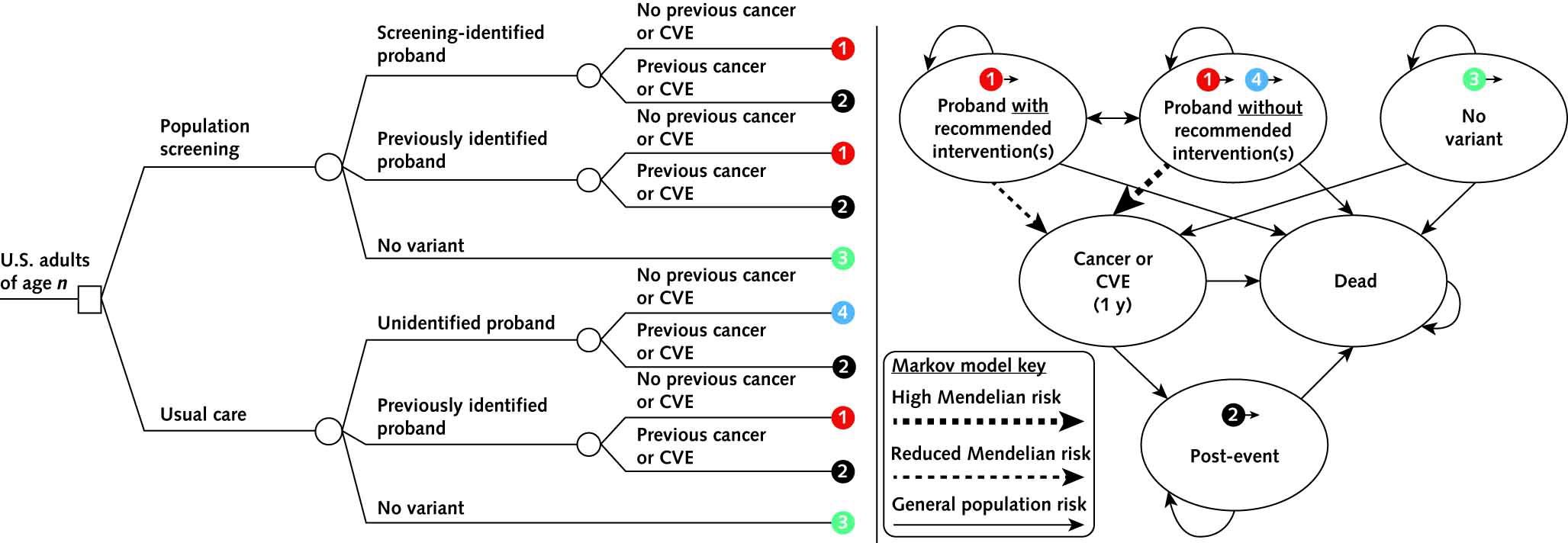 Figure 1. Conceptual diagram of decision analytic model structure, showing identification of a variant, receipt of recommended interventions, and clinical events. In "Population genomic screening for three common hereditary conditions: A cost-effectiveness analysis" (Annals of Internal Medicine 2023).
Figure 1. Conceptual diagram of decision analytic model structure, showing identification of a variant, receipt of recommended interventions, and clinical events. In "Population genomic screening for three common hereditary conditions: A cost-effectiveness analysis" (Annals of Internal Medicine 2023).
Garbett and Schildcrout are faculty biostatisticians on projects with the Vanderbilt Biostatistics Data Coordinating Center.
Biometrics paper of the year
Congratulations to professor Bryan Shepherd and principal biostatistician Aihua Bian on winning the 2023 Biometrics Best Paper Award, for "Multiwave validation sampling for error-prone electronic health records." The article was co-authored by Vanderbilt colleagues Shannon Pugh (Emergency Medicine), Stephany Duda (Biomedical Informatics), and William J. Heerman (Pediatrics), along with Kyunghee Han (University of Illinois at Chicago), Tong Chen (University of Auckland), Thomas Lumley (University of Auckland), and Pamela A. Shaw (Kaiser Permanente). The team used EHR data to "estimate the association between maternal weight gain during pregnancy and the risks of her child developing obesity or asthma." As the first known implementation of a multiwave sampling design, the study yielded several lessons learned and offers an R package (optimall) to address some of the data-handling chores:
First, adaptive sampling designs provide an important chance to recover from a poorly chosen first sampling wave. Second, we learned that it takes quite a bit of time between receiving validation data from one wave to design the next wave. Upon receiving validation data we needed to perform data quality checks, deidentify data, rerun FPCA analyses, refit regression models to estimate influence functions, recompute Neyman allocation, and then meet as a team to discuss whether and how to divide strata. Keeping track of interim data sets also became tedious. To alleviate some of these challenges we have developed an R package, optimall, which performs Neyman allocation, allows easy splitting of strata, and keeps track of various data sets in an efficient manner. This package also implements integer-valued Neyman allocation (Wright, 2017), which provides exact optimality for a fixed sample size (ie, avoids rounding issues) and was employed in later waves of our validation sampling.
The research was supported in part by PCORI award R-1609-36207 and NIH grants R01AI131771 and UL1TR002243.
This paper's team members are also the authors (with Vanderbilt Pediatrics and Nursing postdoc Nadia Sneed) of "Associations between gestational weight gain, gestational diabetes, and childhood obesity incidence," which appeared in the print issue of Maternal and Child Health Journal this month (following its initial e-publication in November). Drs. Shepherd, Shaw, and Duda are also known for their work on validating EHR data for HIV/AIDS research, which was recently recognized with a MERIT Award from the National Institute of Allergy and Infectious Diseases.
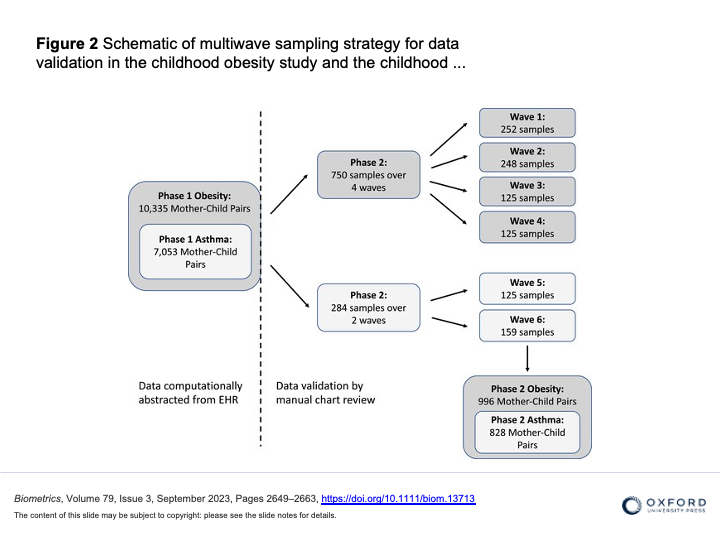
Schematic of multiwave sampling strategy for data validation in the childhood obesity study and the childhood asthma substudy. The numbers do not sum to 996 because of overlap of 38 records sampled for both the obesity and asthma studies. Figure 2 in Shepherd et al., "Multiwave validation sampling for error-prone electronic health records," © 2022 The International Biometric Society. https://doi.org/10.1111/biom.13713
First-authored paper in Biometrics by Chiara Di Gravio
Congratulations to recent PhD graduate Chiara Di Gravio and her dissertation advisers, professor Jonathan Schildcrout and associate professor Ran Tao, on the publication of Efficient designs and analysis of two-phase studies with longitudinal binary data in the March 2024 issue of Biometrics. The paper presents a flexible full-cohort analysis method known as an efficient sieve maximum likelihood estimator (SMLE). The work was made possible in part by ACCRE, Vanderbilt's high-performance computing cluster, with data from the Lung Health Study.
Dr. Di Gravio graduated from Vanderbilt in August 2023 and is now a postdoc at Imperial College London. In December 2023, she delivered a talk titled "The relationship between self-reported persistent symptoms post-COVID-19 and employment among adults in England, UK" at the Demystifying Long COVID International Conference in Madrid. The presentation was live-tweeted in English by Jon-Ruben van Rhijn and in French by ApresJ20 (Association Covid Long France).
Study links small pancreas size to faster progression to stage 3 Type 1 diabetes
Contributors to this study include research assistant professor Liping Du and associate professor Hakmook Kang.
VN-BioStat report in International Journal of Statistics and Probability
The final 2023 issue of International Journal of Statistics and Probability included "The Vanderbilt Nigeria Biostatistics Training Program (VN-BioStat): Results from a Skills Workshop." Professor and principal investigator Bryan Shepherd is first author of this paper, written in collaboration with Vanderbilt colleagues in the Institute for Global Health, the Division of Infectious Diseases, the Department of Health Policy, and the Office of the Vice Provost for Research and Innovation, as well as collaborators at Bayero University and the University of Southern California.
Welcome - Mackenzie Stuenkel
We are excited to welcome Mackenzie Stuenkel to the department and the Vanderbilt Biostatistics Data Coordinating Center Data Management Unit. Dr. Stuenkel earned her PhD in applied health research and evaluation from Clemson University, and then worked as lead research specialist at the Bradshaw Institute for Community Child Health & Advocacy, a division of Prisma Health Children's Hospital. She brings to Vanderbilt experience in COVID-19 vaccination and testing tracking and manuscript preparation, grant writing, tech support, and data optimization and analytics, as well as expertise in implementation science, program and process evaluation, mental health research, and more. She is first author of "School-based mental health service utilization through the COVID-19 pandemic and beyond" (Journal of School Health, 2023) and has co-authored peer-reviewed papers on emergency departments (Journal of Safety Research, 2023), pediatric referrals (Journal of Community Health, 2023), healthcare worker experiences (International Journal of Environmental Research and Public Health, 2023), and diagnosing COVID-19 in young adults (Journal of American College Health, 2023).
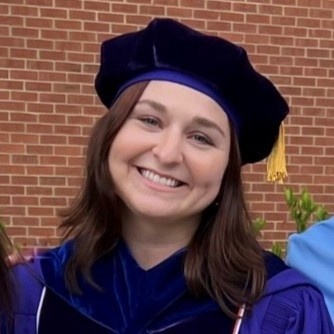
Simon Vandekar promoted to associate professor
We are pleased to announce the promotion of Dr. Simon Vandekar (left, with VN-Biostat fellows Rukayya Alkassim and Safiya Sada Sani and perhaps a future biostatistician) to associate professor of biostatistics (investigator track, with tenure), effective as of February 1. A graduate of Penn State (BS, psychology) and the University of Pennsylvania (PhD, biostatistics), Dr. Vandekar joined our department in 2018. He is best known for his methodological research in the analysis of neuroimaging data. He has developed robust intermodal and group-level inference procedures for neuroimaging and more recently has focused on the development and inference of a robust effect size index (RESI). Upon joining VUMC, he also began developing statistical methods for analyzing multiplexed immunofluorescence (mIF) imaging. His methodological research is supported by a National Institute of Mental Health (NIMH) R01 grant and an internal Gastrointestinal Specialized Program of Research Excellence (GI SPORE) career enhancement award.
As of this writing, Dr. Vandekar has published nearly 70 papers in top-tier journals (with at least 12 as first or senior author), including Journal of the American Statistical Association, Biostatistics, Biometrics, Journal of Neuroscience, NeuroImage, Bioinformatics, Cell, and Science. He has given more than 20 invited talks nationally and at international biostatistics conferences. His primary area of collaboration is in psychiatry, with a particular emphasis on neurodevelopmental disorders. Dr. Vandekar serves as director of graduate recruitment and was named Outstanding Faculty Mentor in 2021. His extramural activities include program chair responsibilities for the Section on Statistics in Imaging of the American Statistical Association (ASA; 2020–2022), organizing the Statistical Methods in Imaging Conference (2022), and leading the Middle Tennessee Chapter of the ASA as its president (2021–2023).
Welcome - Lauren E. King
We are delighted to welcome Lauren E. King to the department as our new research program manager. King earned her bachelor's degree in nutrition and wellness, with a minor in public health, from Auburn University, followed by her master's of public health with a concentration in epidemiology from the University of Alabama at Birmingham. She joined Vanderbilt University Medical Center in 2021 as a clinical/translational research coordinator on Dr. Debra L. Friedman's team, where she worked extensively with oncologic study personnel, procedures, and data. Her extracurricular activities have included volunteering as a research assistant for an Alabama arm of the COVID COMET strategy and competing in ultimate frisbee.
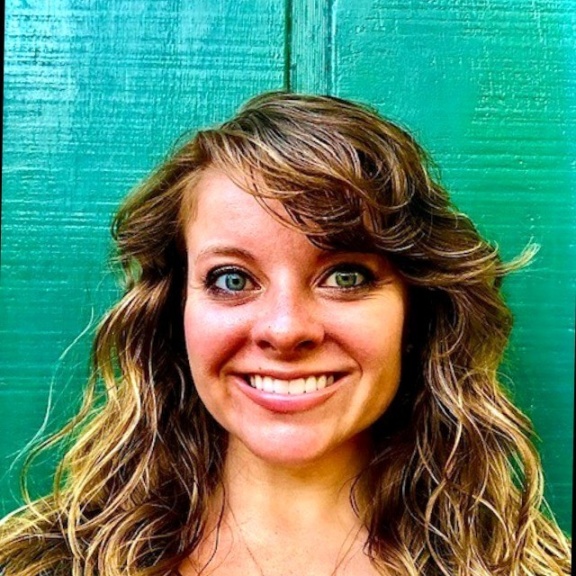
scKWARN: a new method to remove technical biases
Congratulations to research assistant professor Chih-Yuan Hsu, visiting PhD candidate Chia-Jung "Charlene" Chang, and professors Qi Liu and Yu Shyr on the publication of scKWARN: Kernel-weighted-average robust normalization for single-cell RNA-seq data in Bioinformatics, with Liu and Shyr as corresponding authors.
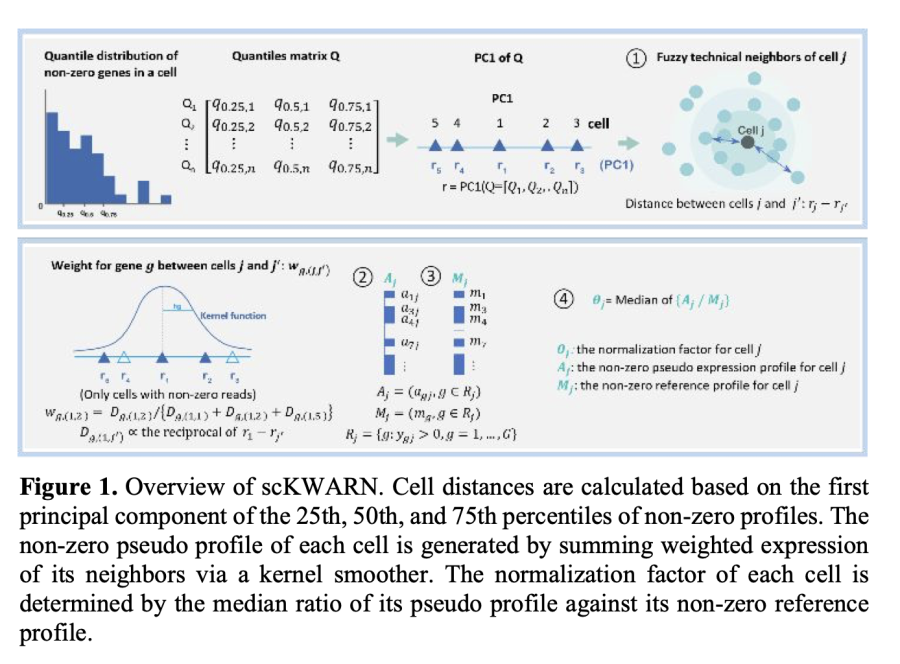
FindAdapt: A new package for small RNA sequencing
Congratulations to data scientist assistant Hua-Chang Chen, research assistant professor Jing Wang, and professors Yu Shyr and Qi Liu on the January 22 publication of FindAdapt: A python package for fast and accurate adapter detection in small RNA sequencing, in PLoS Computational Biology.